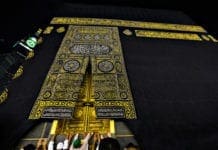All praise be to Allah and peace be upon the Messenger of Allah. I bear witness that there is no god but Allah alone who has no partner. And I bear witness that Muhammad is His Servant and Messenger.
These are selections from the biography of the Mother of the Believers and the wife of the Messenger of Allah ﷺ. She was born 15 years before the Year of the Elephant and was one of the honorable women of Quraysh.
When she had grown up, she was known with “the chaste” because she refused to do as the women of the Pre-Islamic Era did. She was a good merchant of high honor and wealth, and the Prophet ﷺ married her while she was 40 years old and he was 25. He did not marry another but she had died because of her merit and status. She gave birth to Al Qasim then Zaynab, Ruqayyah, Um Kulthum, Fatimah, and `Abdullah who was called the good and the virtuous.
All the Prophet’s sons died in young age, whereas the girls became Muslims and migrated but they died during his lifetime except Fatimah who died after him. Khadijah was the first to believe in the Prophet ﷺ before anyone, comforted him, and took him to her cousin Waraqah.
Allah commanded the Prophet to give her glad tiding with a house in Paradise which is made of pearl where there will be neither any noise nor any fatigue.
She was Khadijah bint khuwaylid ibn Asad Al Qurashyyah Al Asadiyyah who was the best of women worldwide.
 Adh-Dhahaby (may Allah bestow mercy on his soul) said: “She was reasonable, venerable, religious, honorable, and from the people of Paradise. The Prophet ﷺ used to commend her and prefer her to all mothers of the believers and exaggerate in glorifying her to the extent that `A’ishah used to say: “I have never felt jealousy of any woman more than Khadijah because of the Prophet’s frequent mentioning of her.”[1]
Adh-Dhahaby (may Allah bestow mercy on his soul) said: “She was reasonable, venerable, religious, honorable, and from the people of Paradise. The Prophet ﷺ used to commend her and prefer her to all mothers of the believers and exaggerate in glorifying her to the extent that `A’ishah used to say: “I have never felt jealousy of any woman more than Khadijah because of the Prophet’s frequent mentioning of her.”[1]
Al Bukhari and Muslim reported in their Sahih from the Hadith of Abu Hurayrah (may Allah be pleased with him) who narrated that Gabriel came to the Prophet ﷺ and said: “O Allah’s Messenger! This is Khadijah coming to you with a dish having meat soup (or some food or drink). When she reaches you, greet her on behalf of her Lord (i.e. Allah) and on my behalf, and give her the glad tidings of having a Qasab palace in Paradise wherein there will be neither any noise nor any fatigue (trouble).”[2]
As-Suhayly said: “The Prophet ﷺ gave her glad tiding of Paradise because she had the privilege of believing in him before others and because she never raised her voice to the voice of the Prophet ﷺ and did not cause him trouble or harm.”[3]
Ibn Ishaq said: “Calamities continued to hit the Messenger ﷺ starting with the death of Abu Talib and Khadijah who was a sincere advisor. Her father related to the Prophet ﷺ in his 4th grandfather Qusy ibn Kilab and her mother related to the Prophet ﷺ in her 8th grandfather Lu’y ibn Ghalib. She was rich and offered money to the Prophet ﷺ to go to the Levant (the region covering Syria, Lebanon, Jordan, and Palestine) for commerce. So, he went with her servant Maysarah, and when he came back Khadijah admired his honesty and offered herself to him for marriage, then he married her and gave her 20 camels.[4] [5]
Of her great attitudes is the Hadith that was reported by Al Bukhari in his Sahih that `A’ishah (may Allah be pleased with him) said:
 The commencement (of the Divine Inspiration) to Allah’s Messenger ﷺ was in the form of true dreams in his sleep, for he never had a dream but it turned out to be true and clear as the bright daylight. Then he began to like seclusions, so he used to go in seclusion in the cave of Hira where he used to worship Allah continuously for many nights before going back to his family to take the necessary provision (of food) for the stay. He come back to (his wife) Khadijah again to take his provision (of food) likewise, till one day he received the Guidance while he was in the cave of Hira. An Angel came to him and asked him to read. Allah’s Messenger ﷺ replied: “I do not know how to read.” The Prophet ﷺ added, “Then the Angel held me (forcibly) and pressed me so hard that I felt distressed. Then he released me and again asked me to read, and I replied: ‘I do not know how to read.’ Thereupon he held me again and pressed me for the second time till I felt distressed. He then released me and asked me to read, but again I replied. ‘I do not know how to read.’ Thereupon he held me for the third time and pressed me till I got distressed, and then he released me and said: ‘Read, in the Name of your Lord Who has created (all that exists), has created man out of a clot, Read! And your Lord is the Most Generous. Who has taught (the writing) by the pen, has taught man that which he knew not.” (96:1-5). Then Allah’s Messenger ﷺ returned with that experience; and the muscles between his neck and shoulders were trembling till he came upon Khadijah (his wife) and said: “Cover me!” They covered him, and when the state of fear was over, he said to Khadijah, “O Khadijah! What is wrong with me? I was afraid that something bad might happen to me.” Then he told her the story. Khadijah said: “Nay! But receive the good tidings! By Allah, Allah will never disgrace you, for by Allah, you keep good relations with your Kith and kin, speak the truth, help the poor and the destitute, entertain your guests generously and assist those who are stricken with calamities.” Khadijah then took him to Waraqah ibn Naufal, the son of Khadijah’s paternal uncle. Waraqah had been converted to Christianity in the Pre-Islamic Period and used to write Arabic and write of the Gospel in Arabic as much as Allah wished him to write. He was an old man and had lost his eyesight. Khadijah said (to Waraqah), “O my cousin! Listen to what your nephew is going to say.” Waraqah said: “O my nephew! What have you seen?” The Prophet ﷺ then described whatever he had seen. Waraqah said: “This is the same Angel (Gabriel) who was sent to Moses. I wish I were young.” He added some other statement. Allah’s Messenger ﷺ asked, “Will these people drive me out?” Waraqah said: “Yes, for nobody brought the like of what you have brought, but was treated with hostility. If I were to remain alive till your day (when you start preaching), then I would support you strongly.” But a short while later Waraqah died and the Divine Inspiration was paused (stopped) for a while so that Allah’s Messenger ﷺ was very much grieved.[6]
The commencement (of the Divine Inspiration) to Allah’s Messenger ﷺ was in the form of true dreams in his sleep, for he never had a dream but it turned out to be true and clear as the bright daylight. Then he began to like seclusions, so he used to go in seclusion in the cave of Hira where he used to worship Allah continuously for many nights before going back to his family to take the necessary provision (of food) for the stay. He come back to (his wife) Khadijah again to take his provision (of food) likewise, till one day he received the Guidance while he was in the cave of Hira. An Angel came to him and asked him to read. Allah’s Messenger ﷺ replied: “I do not know how to read.” The Prophet ﷺ added, “Then the Angel held me (forcibly) and pressed me so hard that I felt distressed. Then he released me and again asked me to read, and I replied: ‘I do not know how to read.’ Thereupon he held me again and pressed me for the second time till I felt distressed. He then released me and asked me to read, but again I replied. ‘I do not know how to read.’ Thereupon he held me for the third time and pressed me till I got distressed, and then he released me and said: ‘Read, in the Name of your Lord Who has created (all that exists), has created man out of a clot, Read! And your Lord is the Most Generous. Who has taught (the writing) by the pen, has taught man that which he knew not.” (96:1-5). Then Allah’s Messenger ﷺ returned with that experience; and the muscles between his neck and shoulders were trembling till he came upon Khadijah (his wife) and said: “Cover me!” They covered him, and when the state of fear was over, he said to Khadijah, “O Khadijah! What is wrong with me? I was afraid that something bad might happen to me.” Then he told her the story. Khadijah said: “Nay! But receive the good tidings! By Allah, Allah will never disgrace you, for by Allah, you keep good relations with your Kith and kin, speak the truth, help the poor and the destitute, entertain your guests generously and assist those who are stricken with calamities.” Khadijah then took him to Waraqah ibn Naufal, the son of Khadijah’s paternal uncle. Waraqah had been converted to Christianity in the Pre-Islamic Period and used to write Arabic and write of the Gospel in Arabic as much as Allah wished him to write. He was an old man and had lost his eyesight. Khadijah said (to Waraqah), “O my cousin! Listen to what your nephew is going to say.” Waraqah said: “O my nephew! What have you seen?” The Prophet ﷺ then described whatever he had seen. Waraqah said: “This is the same Angel (Gabriel) who was sent to Moses. I wish I were young.” He added some other statement. Allah’s Messenger ﷺ asked, “Will these people drive me out?” Waraqah said: “Yes, for nobody brought the like of what you have brought, but was treated with hostility. If I were to remain alive till your day (when you start preaching), then I would support you strongly.” But a short while later Waraqah died and the Divine Inspiration was paused (stopped) for a while so that Allah’s Messenger ﷺ was very much grieved.[6]
Of her great situations is that she shared all conditions with the Prophet ﷺ for better and worse. She entered with him the mountain-pass blockade where hunger and thirst hit them badly to the extent that they ate the tree leaves; and in the year the Prophet got out from the mountain pass, Khadijah died.
She was the best of women. Al Bukhari and Muslim reported in their books of authentic Hadiths from the Hadith of `Abdullah ibn Ja`far (may Allah be pleased with him) who said: “Mary, the daughter of `Imran, was the best among the women (of the world of her time) and Khadijah is the best amongst the women. (of this nation).”[7]
Due to the love of the Prophet ﷺ to Khadijah and his loyalty to her, Al Bukhari and Muslim reported in their books of authentic Hadiths that `A’ishah (may Allah be pleased with him) said: “I did not feel jealous of any of the wives of the Prophet ﷺ as much as I did of Khadijah though I did not see her, but the Prophet ﷺ used to mention her very often, and whenever he slaughtered a sheep, he would cut its parts and send them to the women friends of Khadijah. When I sometimes said to him, (You treat Khadijah in such a way) as if there is no woman on earth except Khadijah, he would say, Khadijah was such-and-such, and from her I had children.”[8] In another narration: “I have been granted her love.[9]
 It was reported in Sahih Al Bukhari and Sahih Muslim from the Hadith of `A’ishah (may Allah be pleased with him) who said: “Once Hala bint Khuwailid, Khadija’s sister, asked the permission of the Prophet ﷺ to enter. On that, the Prophet ﷺ remembered the way Khadijah used to ask permission, and that upset him. He said: “O Allah! Hala!” So I became jealous and said: What makes you remember an old woman amongst the old women of Quraysh an old woman (with a teethless mouth) of red gums[10] who died long ago, and in whose place Allah has given you somebody better than her?”[11] In another narration: “Allah did not give me someone in her place. She believed in me when people denied me, she believed me, when people did not, she supported me with her money, when people deprived me, Allah has blessed me with her children and deprived me of the children of people.”[12]
It was reported in Sahih Al Bukhari and Sahih Muslim from the Hadith of `A’ishah (may Allah be pleased with him) who said: “Once Hala bint Khuwailid, Khadija’s sister, asked the permission of the Prophet ﷺ to enter. On that, the Prophet ﷺ remembered the way Khadijah used to ask permission, and that upset him. He said: “O Allah! Hala!” So I became jealous and said: What makes you remember an old woman amongst the old women of Quraysh an old woman (with a teethless mouth) of red gums[10] who died long ago, and in whose place Allah has given you somebody better than her?”[11] In another narration: “Allah did not give me someone in her place. She believed in me when people denied me, she believed me, when people did not, she supported me with her money, when people deprived me, Allah has blessed me with her children and deprived me of the children of people.”[12]
She died 10 years after the mission of the Prophet ﷺ in Ramadan. It was said that she died eight or seven years after the mission, and was buried in Al Hujun.[13]That year was mentioned in the books of biographies under the name of “The year of sadness” because of the Prophet’s sadness to her. May Allah reward her the best for what she offered for Islam and Muslims.
Praise be to Allah, the Lord of the worlds [i.e., people], and peace be upon our Prophet Muhammad, his family, and all his Companions.
[1] Siyar A`lam An-Nubala’ (2/110).
[2] No. 3820 and Sahih Muslim No. 2432.
[3] Al Bidayah wa An-Nihayah of Ibn Kathir 4/317.
[4] male and she-male camels.
[5] Sirat Ibn Hisham 1/236, 2/26 with paraphrasing.
[6] No. 3 and Sahih Muslim No. 160.
[7] No. 3432 and Sahih Muslim No. 2430.
[8] No. 3818 and Sahih Muslim No. 2434 with bit it is not here
[9] Sahih Muslim No. 2435.
[10] With red gums: As-Sindy said: The meaning is that her teeth fell until the redness of her gum appeared as a proof to her old age.
[11] Sahih Al Bukhari No. 3821 and Sahih Muslim No. 2437.
[12] Musnad Imam Ahmad 41/356 No. 24864, the verfiers of Hadith graded it as authentic.
[13] Al Hujun was a place one mile and half away from the Sacred House at the cemetary of her family. Mu`jam Al Buldan 5/123.











